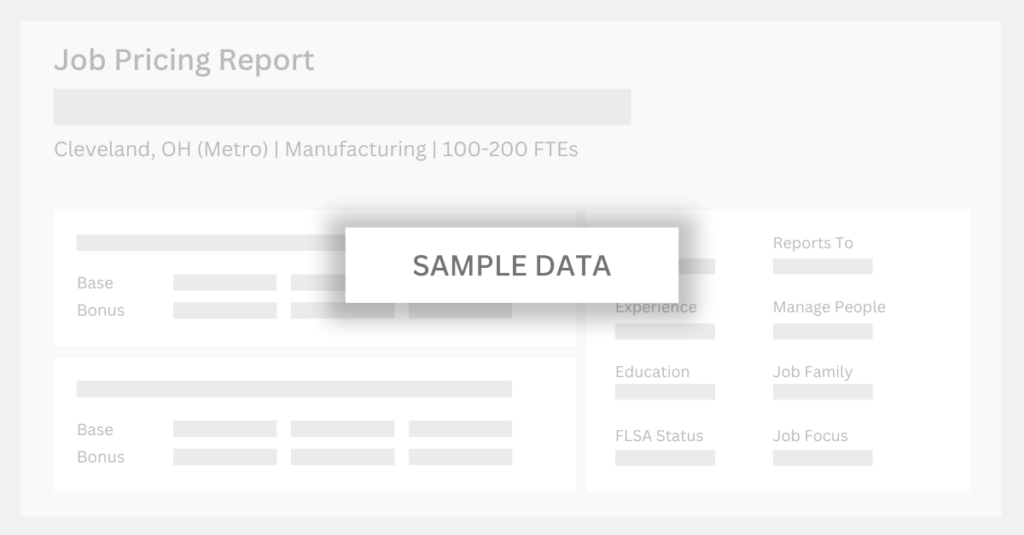Compensation Data for a Controller in Ohio

Compensation data breakouts:
- Location (example: Cleveland, Akron, Ohio, National)
- Company Size (number of full-time employees)
- Industry (industry-specific or all industries)
- Years of Experience
- Education
Data included in each report:
- Base Compensation (Salary or Wage)
- Total Compensation
- Bonus
- Long-term Incentives
- Job Description
- Competencies/Skills
Get a Free Sample Report
Submit the form below to receive a sample job pricing report or to access ERC’s compensation data.

ERC is a leading provider of compensation data
Whether you’re actively recruiting and hiring or trying to stay competitive, having local salary and wage data is critical. ERC members gain access to compensation reports, job description research, and an HR Help Desk for compensation and workplace practices data.
Job Description
Overview
- Heads the accounting operation of an organization’s accounting division, including the maintenance of accounting principles, practices, and procedures.
- Directs and plans the maintenance of fiscal records and preparation of financial reports that summarize and forecast company business activity and financial position in areas of income, expenses, and earnings, based on past, present, and
- expected operations.
- Oversees determination of depreciation rates to apply to capital assets.
- Establishes or recommends major economic objectives and policies for company or subdivision to management.
Typical Functions
- May direct preparation of budgets.
- May prepare reports required by regulatory agencies.
- May advise management on desirable operational adjustments due to tax code revisions.
- May arrange for audits of company accounts.
- May advise management about property and liability insurance coverage needed.
- May direct financial planning, procurement, and investment of funds for organization.
Similar Positions
There are several positions that share similar responsibilities to a Controller, including:
- Chief Financial Officer (CFO)
- Finance Director
- Financial Controller
- Accounting Manager
- Director of Finance
- Corporate Controller
- Accounting Supervisor
Experience and Education
A Controller typically requires a combination of education, professional certifications, and substantial experience in finance and accounting. Most Controllers hold a bachelor’s degree in accounting, finance, or a related field, while some may have advanced degrees such as an MBA or a master’s in accounting. Professional certifications such as Certified Public Accountant (CPA) or Certified Management Accountant (CMA) are highly desirable and may be required for certain positions.
Controllers generally gain experience by progressing through various accounting roles, such as senior accountant or accounting manager, and demonstrating proficiency in financial management, reporting, budgeting, and analysis. They should have a deep understanding of financial principles, accounting regulations, and reporting standards. Experience in managing financial systems, leading teams, and implementing internal controls is also valuable.
Excellent analytical skills, attention to detail, and the ability to interpret financial data for strategic decision-making are essential for Controllers. Strong communication and leadership abilities are crucial for effectively collaborating with senior management, advising on financial matters, and overseeing the finance department’s operations.
Continuous learning and staying updated with industry trends and regulatory changes are vital for Controllers to perform their responsibilities effectively.
Competencies and Skills
- Financial management
- Accounting knowledge
- Compliance and regulations
- Financial systems and tools
- Leadership and team management
- Analytical skills
- Risk management
Why ERC Compensation Data?
Through frequent polls and surveys, ERC offers a comprehensive collection of recent, reliable data covering workplace practices, employee compensation, benefits, wages, and salaries from local, regional, and national samples.
While “free” compensation data can be found on the web, here’s why you should be cautious:
- Validity — Often “free” salary data is collected from anyone willing to participate or share information. This means you don’t have a good sense of how big the sample size is, the geography of the data, or the type or size of organizations from which the data is being collected.
- Recency — ERC’s survey data relies on regular and consistent participation to ensure that the data is recent, while “free” pay data sources may provide data that is many years old.

